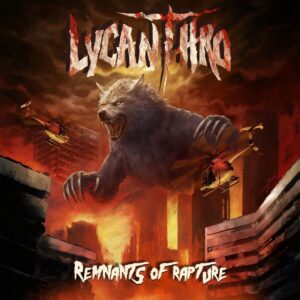Lycanthro Returns to Howl at the Moon: Remnants of Rapture bleeds Power, Precision, and Cinematic Fury
If Remnants of Rapture is a love letter to power and thrash metal, Lycanthro signed it in blood and sealed it with fire.
The album opens with Iris- a sweeping, cinematic introduction that sets the tone for everything to follow. The delicate classical guitar melody is quickly doubled by electric harmonies, dissolving into blast beats and soaring vocals. Every member of the band seems to step forward in this opening track, introducing themselves with melody, force, and precision. It’s composed like an overture- and it works.
Far Beyond the Walls wastes no time, cold-opening with layered a cappella harmonies before crashing headlong into battle. The chorus hits like a Viking war cry- catchy, anthemic, and completely primal. A killer high note seals the deal, while the bridge feels like a medieval bard rallying troops before a battle. By the end, the final howl-like vocal hits with eerie brilliance- more wolf than man. Awoo.
Title Track Remnants of Rapture kicks up the aggression, with the most unrestrained vocal performance on the record. The bass steals the spotlight in the bridge, building from a stripped-down groove into a soaring section stacked with harmonies.
Cry Silver leans into melody. The guitar work is lyrical, the vocals are hooky, and the organ adds a haunting atmosphere. This track feels tailor-made for live crowds- easily the most anthemic and accessible moment on the album.
Prison Eyes is a personal favorite- opening with acoustic guitar and soft, technically masterful vocals. The slow build and emotional arc show Lycanthro’s softer side without sacrificing strength. It’s a beautiful track, full of restraint and release.
That calm doesn’t last. In Demon Light crashes back in with snarling guitars and rhythmic punishment. The pre-chorus offers a breath of air before the song explodes again, a brilliant use of space that demonstrates Lycanthro’s skill with dynamics.
Then comes The Great Masquerade featuring guest powerhouse Laura Guldemond. The string accents, guitar harmonics, and percussive build all lead up to a vocal performance that completely steals the show. Guldemond’s range and power are unreal- if you listen to one guest feature on this album, make it this one. The following track, Night of the Parasite, does give it a run for its money. Featuring Stu Block, the track opens with pounding drums and chunky rhythm guitar before Block swoops in like a banshee with both searing highs and growling lows. The energy is relentless, and the blast beats? Absolutely merciless. This one HAD to be the drummer’s favorite track on the record.
Lost Jerusalem changes the palette again, opening with haunting piano and strings before descending (or ascending?) into full symphonic metal territory. The religious and mystical imagery woven into the lyrics add gravity. As a card (and sword) carrying member of the Knights Templar, I feel like the prime target audience for this song. Tell me Lycanthro… where did you hide the Holy Grail?!
Finally, Solaris closes the album with sheer power and cinematic scale. The soundscape paints an image you can feel- thunder underfoot, rain on your shoulders, lightning in your lungs. What starts as a classical guitar ballad turns into a full-throttle final stand, where every member of Lycanthro gives everything they’ve got. It’s grand, emotional, and fittingly apocalyptic.
From delicate acoustic intros to face-melting solos and operatic harmonies, Remnants of Rapture doesn’t just pay homage to the traditions of metal. It roars new life into them. It’s theatrical without being cheesy, powerful without losing heart, and sharp enough to draw blood. Lycanthro has made something that feels ancient and future-facing at the same time like a metal prophecy just now fulfilled.




